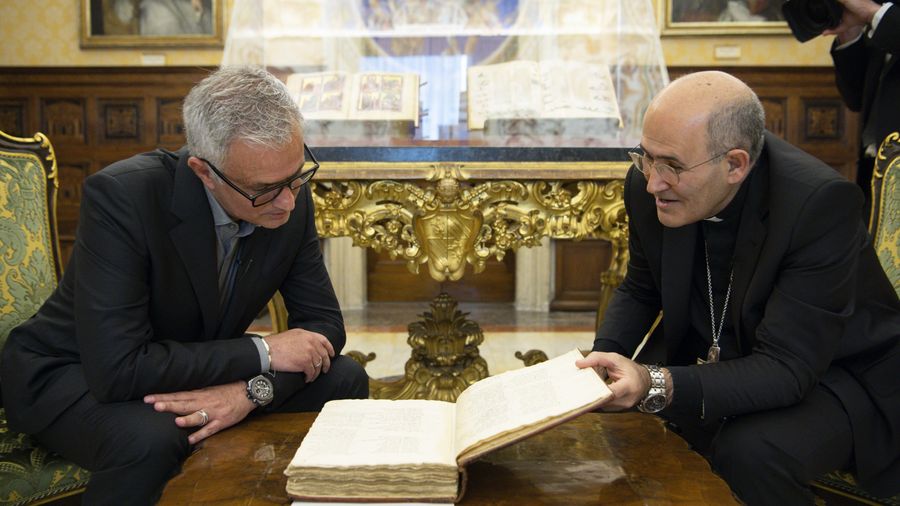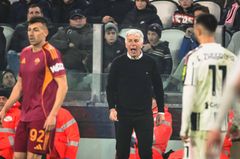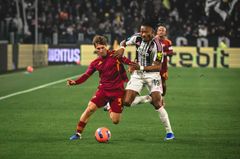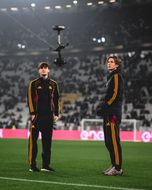
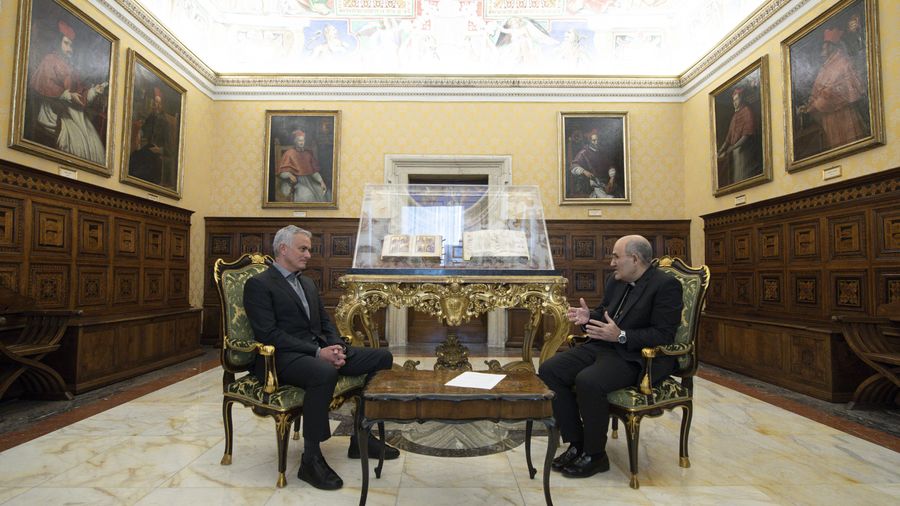
The two men met at the Vatican Library, where they discussed matters of faith and football in a wide-ranging and thoughtful discussion.
Here is just an exerpt of what the two men discussed...
Cardinal Tolentino: "I’m very pleased to be here in this library with you, Jose Mourinho, and I’d like to start off this conversation by talking about someone who, oddly enough, has inspired us both.
"Portugal is quite a strange country, because one of our most original thinkers works in the field of sport, in human kinetics. Rather than in a philosophy journal, you’ll find his writing regularly featured in the pages of sports newspaper A Bola. I wanted to talk to you about professor Manuel Sergio because I know that he has had a significant impact on your own journey.
"His academic contribution has been to propose a new epistemology of human kinetics. He argues that it is necessary to abandon Cartesianism, which creates divisions between reason and emotion, the inner-self and spirit, suggesting that there is a need to understand human nature in all its complexity. One of the concepts he develops is the notion of anthropological and technical periodisation: sport or football is not only technical.
"He argues that there aren’t just shots but people who take shots; there aren’t just jumps but people who jump; there aren’t just goals but people who score goals."
Jose Mourinho: "There aren’t players..."
T: "Exactly, there are people who play. I wanted to talk a bit about this and the importance that it has had on your own journey?"
JM: "It was quite a difficult start because when I arrived at university, in the Department of Sport and Physical Education, I was already fully aware of what I wanted to do: be a coach at the highest level. With all my eagerness to learn about the things that interested me, the first course that I had on my first day of university was the ‘Philosophy of Human Motion’. That was what it was called and it was led by Professor Manuel Sergio.
"When I came out of that first class, I asked myself: what’s the point? He quickly understood that I needed to be helped, to be guided. He actually said to me in very clear and blunt terms: if you only understood football then you understand nothing about football. Our relationship didn’t stop there and it continues to this day."
T: "You’ve developed a friendship."
JM: "It’s not only a friendship, but a constant learning process. One of the biggest challenges we face every day as coaches, as leaders of men – call it what you want – is precisely that, being a leader. It’s about getting the best results. Of course, the aim is to perform at the highest level, but the question is how to get the best from your players, who are not really players but people, as Manuel Sergio argues.
"He has had a big influence on me in this sense, in understanding that every person is different. Every footballer is different from another and how they perform on the pitch is fundamentally the result of the empathy that is created between two people. In this case, it’s between someone much more experienced (i.e., the coach) than the other (i.e., the player). This kind of empathy for me is critical.
"I always give an example from when I left university. Before I got into high-level football, I worked as a teacher. Obviously, my ultimate goal was already clear in my mind, but it was a gradual process. I spent a year working with children who had physical or learning disabilities. I wasn’t prepared for that. I wasn’t ready from a practical perspective. There were many different specialisms available to us at university and I chose high-level performance, so I wasn’t prepared. However, I was able to do well by relying on something very simple: love, empathy and building relationships.
"I got some unbelievable results given that I had felt so under-prepared to work with these children on a practical level. I achieved some fantastic things by relying solely on building relationships. I’ve taken this experience with me in my work over the last 20 years in high-level sport. I’ve always had this as the basic principle. I’m not saying that I’ve always succeeded; at times, I haven’t been able to."
T: "What you’re saying here about failure is really interesting. Reading between the lines, you’re saying: ‘I’ve not always succeeded.’ And human knowledge, the understanding that we have between people, is a kind of knowledge that grows as far as we allow it to. If we set out without requiring absolute certainty, we take a risk and often end up ‘failing’. This failure to achieve what we intend is crucial to aid our understanding of others. In a sense, accepting our failures, our disappointments, our imperfection is what helps us to empathise with others, because we can put ourselves in their shoes and see things with greater depth, to become masters of knowledge."
JM: "Having good and bad experiences is priceless. Sometimes, I think the only things I don’t like very much about getting older are those little aches and pains I have and the fact that I’m a little more tired when I get up in the morning. That’s truly the only thing that I don’t like about my 59 years on this earth so far. If I compare myself as a person and a coach, they are two different things, and it’s the same if I compare myself to 20 years ago. I’m sad that 20 years ago, I didn't have the experiences, be they good or bad, or the knowledge that I have today."
T: "It’s really important for a coach to have this understanding of people."
JM: "Absolutely. On a really practical level, I’m experiencing a kind of deja-vu moment, because what’s happening right now has already happened to me years ago. I’ve already experienced the technical difficulties that I face today years ago. You accumulate good and bad experiences.
"But on a human level, every day is a new one, and every person is a new one. I always refuse to make comparisons between players. In the last 20 years, I’ve come across many footballers and each of them is unique. On a technical level, you can find points of comparison, but to compare them on a personal level is something that I hate doing. Every person is different from another and my approach to them is also different.
"It’s one thing being a 35-year-old coach training 30-year-old players and another being a 59-year-old coach training 25-year-old players. I feel like I’m in a privileged position and I feel so happy in this regard. When a young player is at the start of their career, they think they know everything. Today, when I see young players with this attitude, I don’t criticise them. I’ve been there. Maturity is crucial. However, high-level sport can be very cruel."
T: "An example?"
JM: "We're paid to win. Athletes – not men – are paid to win. We're talking high-level performances and sometimes you have to make cruel decisions when managing a team. There's no time to let people mature and develop."
T: "That time pressure..."
JM: "You pay for mistakes. If I make a mistake, I pay for it by being sacked. If a player makes a mistake, he pays for it by losing his place in the team to someone else. There's a certain cruelty to it but we can't allow the nature of our work to change who we are as people.
"That's something I hold very clearly. I try to help others and myself to be better. One thing I find hard to accept is wasted talent. Even today, after 30 years in the game, I still find it hard to accept. In some cases, wasted talent is a result of the life that players have had, which is why we must try to be teachers in every way.
"High-level sport – and football especially, being the most industrialised sport at every level – has a certain cruelty to it."
T: "Are you worried by the present times, with the war in Europe and all the suffering and devastating destruction after two years of the pandemic? We seem to be heading into a sort of tunnel of despair…"
JM: "Pope Francis says that war is a failing of humanity and politics. I think exactly the same thing. I actually think it’s a human failing more than a political one. It’s a brutal failing involving the loss of principles or the lack of their development. It’s the evolution of human thoughts in the wrong direction in terms of what’s fundamental and what isn’t.
"It’s difficult to explain. It’s a failing across all levels of humanity. It’s a failing of ours."

 Tickets
Tickets
 Shop
Shop













